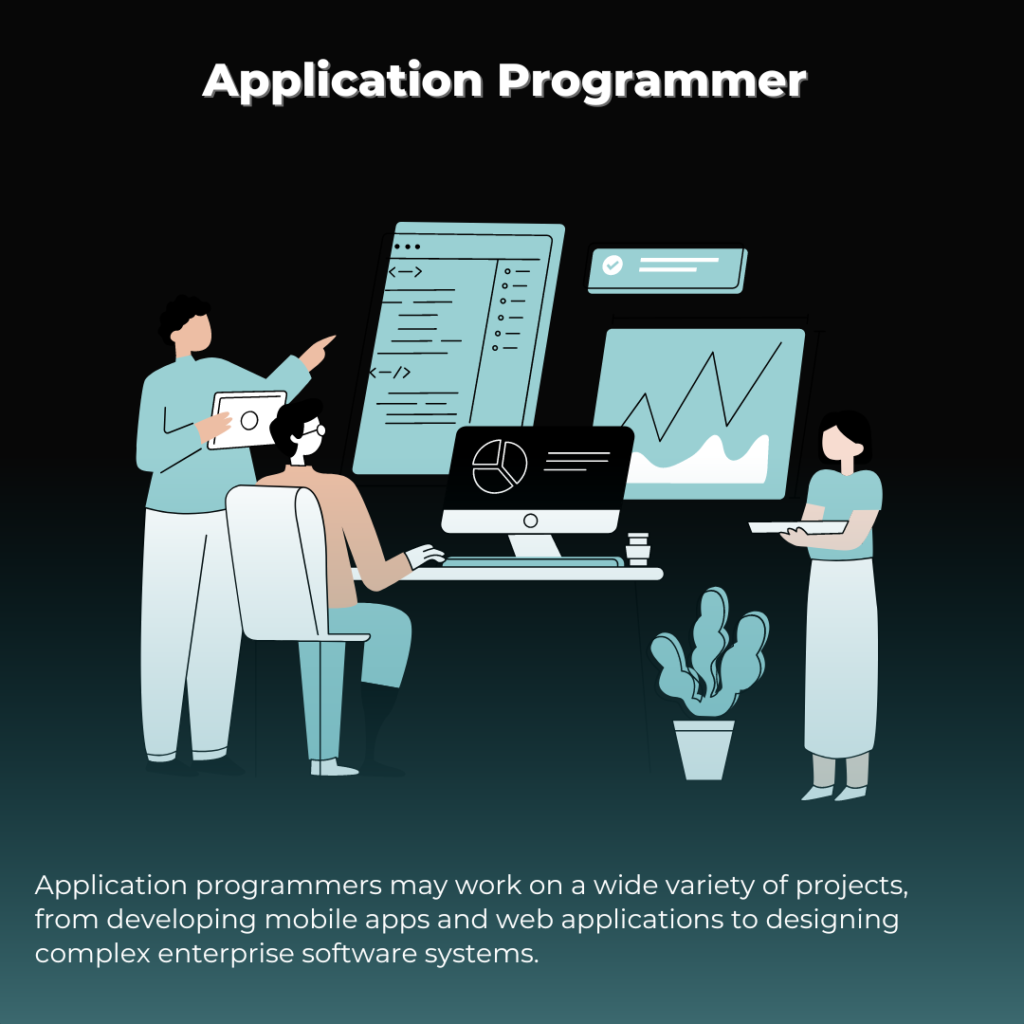Table of Contents

What is Application Programmer?
An application programmer is a software developer who writes, tests, and maintains computer programs designed to perform specific tasks or solve specific problems. Application programmers may work on a wide variety of projects, from developing mobile apps and web applications to designing complex enterprise software systems.
You’ll normally work in specialize development industry, such as mobile phone apps, accounting software, office suites, or graphics software. However, you’ll handle at least one programming language through and out. If you know the Difference Between Application Developer and Software Developer.
The job of an application programmer typically involves the following tasks:
- Analyzing user requirements and developing software specifications
- Designing software architecture and coding software modules
- Testing and debugging software to ensure that it meets the specified requirements
- Maintaining and updating existing software applications
- Collaborating with other programmers, designers, and project managers to ensure successful project outcomes
To be an programmer, one typically needs a strong background in computer science or a related field, as well as proficiency in one or more programming languages such as Java, Python, C++, or JavaScript. Additionally, application programmers must be able to work effectively in teams and have strong communication skills, as software development projects often involve collaboration across multiple departments and disciplines.
Where Application Programmer uses
They are needed in a wide range of industries and settings, as nearly every industry today relies on software applications to some extent. Here are a few examples of where application programmers are commonly employed:
- Technology companies: Technology companies such as Google, Apple, and Microsoft employ large teams of application programmers to develop and maintain their software products.
- Financial institutions: Banks, insurance companies, and other financial institutions require application programmers to develop and maintain software for tasks such as online banking, risk analysis, and fraud detection.
- Healthcare organizations: Healthcare organizations rely on software applications to manage patient data, electronic health records, and medical imaging, among other things. Application programmers are needed to develop and maintain these applications.
- Retail and e-commerce companies: Retail and e-commerce companies use software applications for tasks such as inventory management, online sales, and customer service. Application programmers are needed to develop and maintain these applications.
- Government agencies: Government agencies at the local, state, and federal levels require application programmers to develop and maintain software applications for a wide range of tasks, from tax collection and public safety to transportation and infrastructure management.
In short, application programmers are needed in virtually every industry that relies on software applications to streamline operations, increase efficiency, and improve customer experiences.
What are salary in application programmer
The salary can vary depending on a number of factors, including the industry, location, years of experience, and level of education. Here are some rough estimates of salaries for application programmers:
Entry-level programmers with less than 2 years of experience can expect to earn an average salary of around $60,000 to $70,000 per year.
Mid-level programmers with 2-5 years of experience can expect to earn an average salary of around $80,000 to $100,000 per year.
Experienced programmers with more than 5 years of experience can expect to earn an average salary of around $100,000 to $120,000 per year.
Senior programmers with more than 10 years of experience can expect to earn an average salary of around $130,000 to $150,000 per year.
It’s worth noting that these are rough estimates, and actual salaries can vary depending on a number of factors. Additionally, salaries can be higher in certain industries or locations, such as technology companies in Silicon Valley or financial institutions in New York City.
In India, the salary of an application programmer can vary depending on factors such as the company size, location, years of experience, and level of education. Here are some rough estimates of salaries for application programmers in India:
Entry-level programmers with less than 2 years of experience can expect to earn an average salary of around ₹300,000 to ₹500,000 per year.
Mid-level programmers with 2-5 years of experience can expect to earn an average salary of around ₹500,000 to ₹900,000 per year.
Experienced programmers with more than 5 years of experience can expect to earn an average salary of around ₹900,000 to ₹1,500,000 per year.
Senior programmers with more than 10 years of experience can expect to earn an average salary of around ₹1,500,000 to ₹3,000,000 per year.
It’s worth noting that these are rough estimates, and actual salaries can vary depending on a number of factors, including the industry and location. Additionally, salaries can be higher in certain cities, such as Bangalore, Hyderabad, and Pune, which are hubs for the technology industry in India.
Job that use Application Programmer
There are many jobs that require knowledge and skills in application programming. Here are a few examples:
- Application Developer: This is a common job title for someone who specializes in designing and developing applications for various platforms, such as desktop, mobile, and web.
- Software Engineer: This is a broader job title that can encompass many different roles, including application programming. Software engineers design, develop, and maintain software systems, including applications.
- Full-Stack Developer: A full-stack developer is someone who is skilled in both front-end and back-end development. This includes designing and implementing user interfaces, as well as developing and managing the server-side code.
- Game Developer: Game development requires a strong knowledge of programming, particularly in areas such as graphics rendering and physics simulation.
- Data Analyst: While not strictly an application programming role, data analysts often use programming languages such as Python and R to manipulate and analyze large data sets.
These are just a few examples of jobs that require skills in application programming. Depending on your interests and skills, there are many other possibilities as well.
Characteristics of Application Programmer
Here are some common characteristics :
Strong Programming Skills: Application programmers must have strong programming skills, as they are responsible for writing, testing, and maintaining code for various applications.
Attention to Detail: Attention to detail is critical for application programmers, as even small errors in code can cause significant issues down the line. Careful testing and debugging are essential.
Analytical Thinking: Application programmers must be able to break down complex problems into smaller, more manageable pieces in order to develop effective solutions.
Creativity: Creativity is important for application programmers, as they often need to think outside the box to develop innovative solutions to problems.
Adaptability: Application programming is a constantly evolving field, and programmers must be able to adapt to new technologies and programming languages quickly.
Collaboration: Application programmers often work as part of a team, so strong collaboration skills are important. They must be able to communicate effectively with other programmers, project managers, and stakeholders to ensure that the application meets everyone’s needs.
Continuous Learning: Application programmers must be committed to ongoing learning in order to stay up-to-date with the latest technologies and programming languages. They must be able to seek out new resources, experiment with new tools, and learn from their mistakes in order to continue growing as programmers.
Application Programmer Lifecycle
Planning: In this stage, the programmer works with the project team to determine the requirements of the application, including its features, functionality, and performance. They may also develop a project plan, timeline, and budget.
Design: In the design stage, the programmer creates a blueprint for the application, including its architecture, user interface, and data model. They may also create prototypes to test different design options.
Development: The development stage is where the programmer writes the code for the application, tests it, and fixes any errors or bugs. This stage may involve using different programming languages, frameworks, and tools, depending on the project requirements.
Testing: In the testing stage, the programmer performs various tests to ensure that the application functions as intended, including unit tests, integration tests, and user acceptance tests. They may also use automated testing tools to speed up the testing process.
Deployment: Once the application has been thoroughly tested and approved, the programmer deploys it to the production environment, where it is made available to users.
Maintenance: Even after the application has been deployed, the programmer’s work is not done. They may need to make updates or fixes to the code based on user feedback, performance issues, or changes in the operating environment. They may also need to provide ongoing support to users to ensure that the application continues to meet their needs.
Overall, the lifecycle is a continuous process that involves ongoing collaboration with project teams, users, and stakeholders, as well as a commitment to quality, performance, and innovation.
FAQ
What are the duties of application programmer?
Application programmers design, develop, and maintain software applications to meet specific user needs and business objectives. Their duties include: Coding, Problem Solving, Collaboration, Documentation, Updates, Testing, Optimization, Security, Support, Research.
What is the difference between application programmer and developer?
An programmer primarily focuses on writing code and developing software applications, while a developer encompasses a broader role that includes designing, coding, testing, and often managing the entire software development process, including architecture and project management.
What is the eligibility of application programmer? or How do I become an application programmer?
Eligibility for an application programmer typically includes a bachelor’s degree in computer science or a related field, strong programming skills, and knowledge of relevant programming languages and tools. Specific requirements can vary by employer and job level.
What is the difference between software and application programmer?
A software developer is a broader role that encompasses the entire software development process, including design, coding, testing, and project management. An application programmer, on the other hand, primarily focuses on writing code to develop specific software applications or components.




